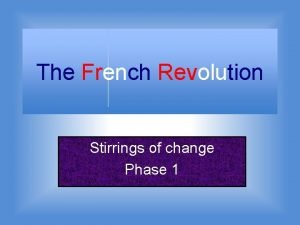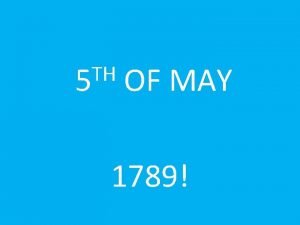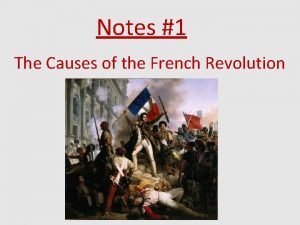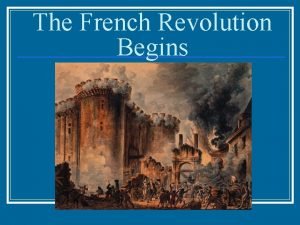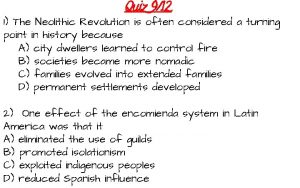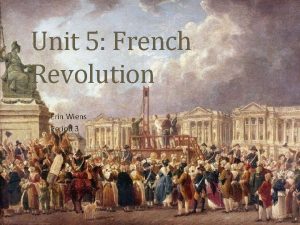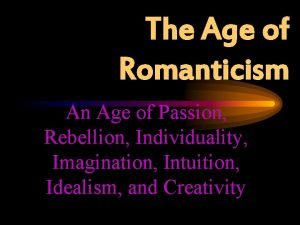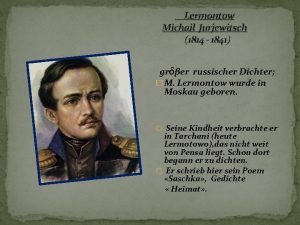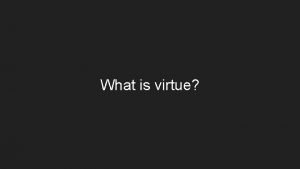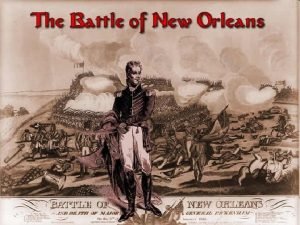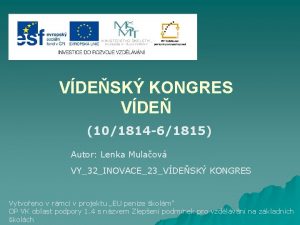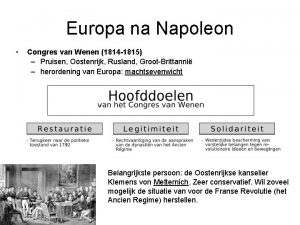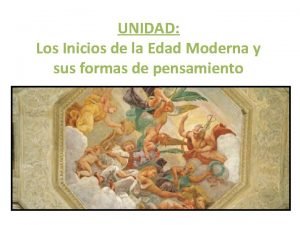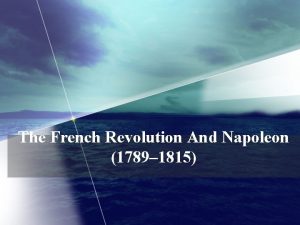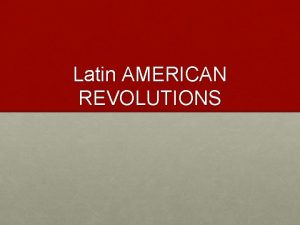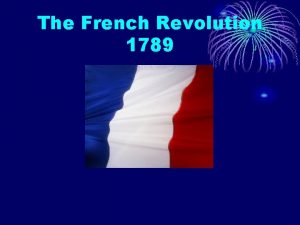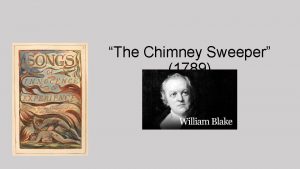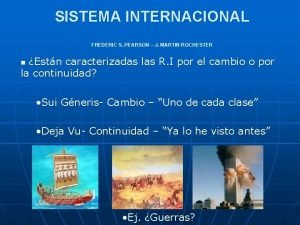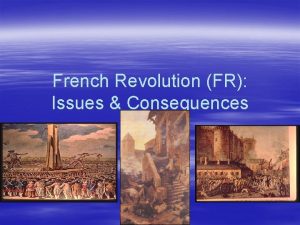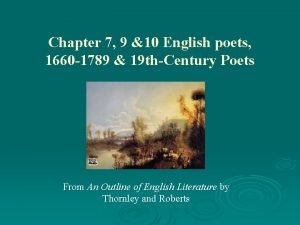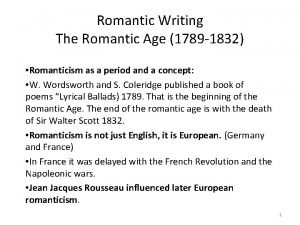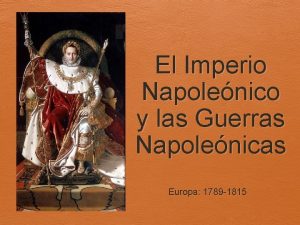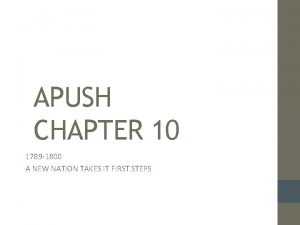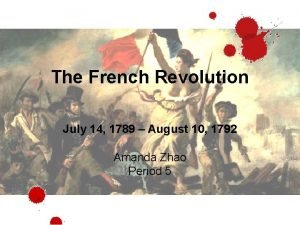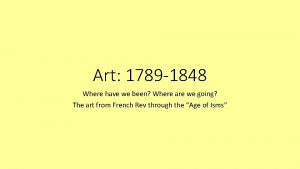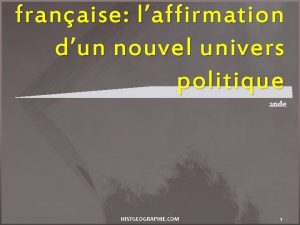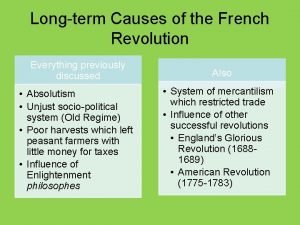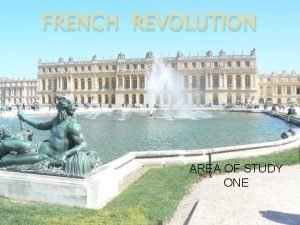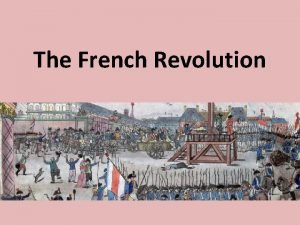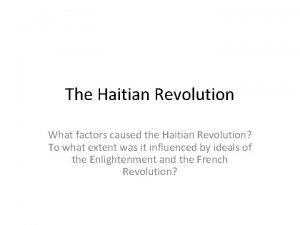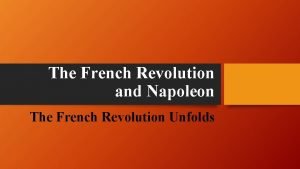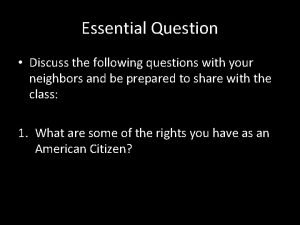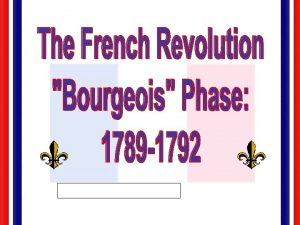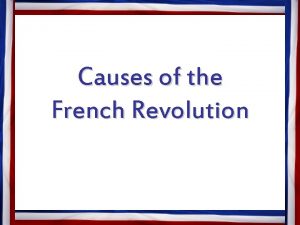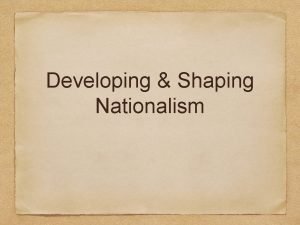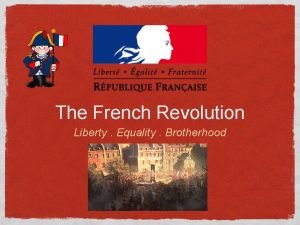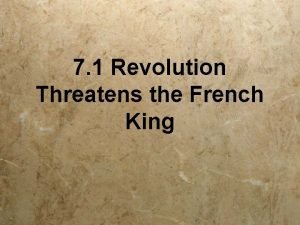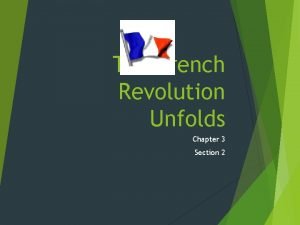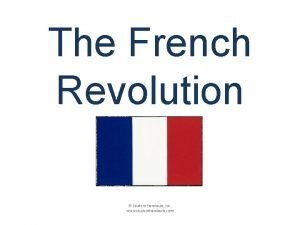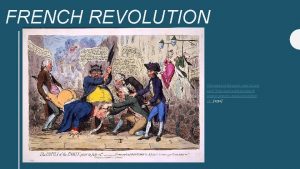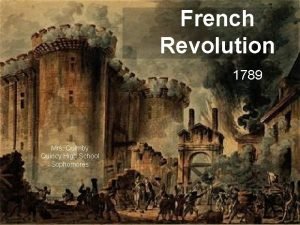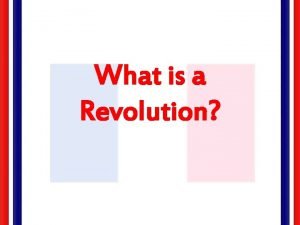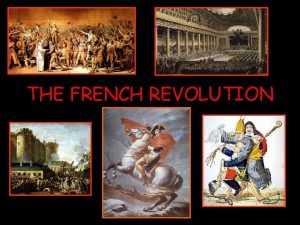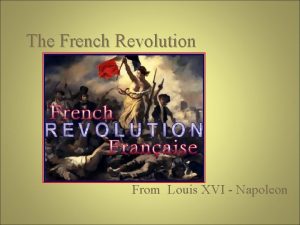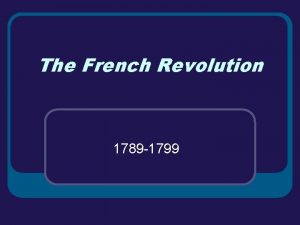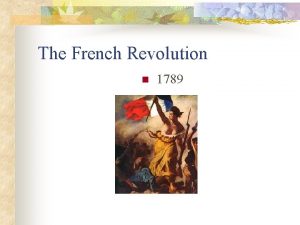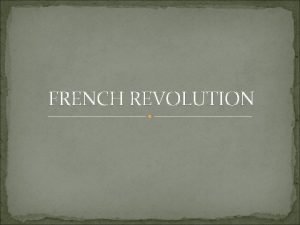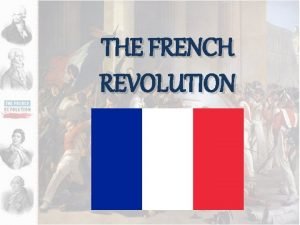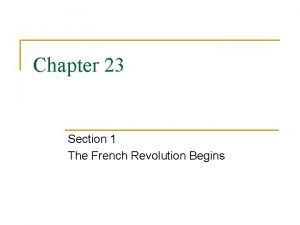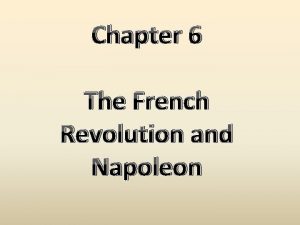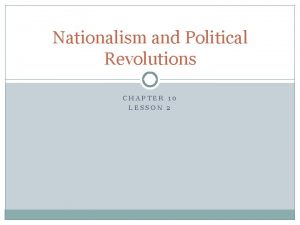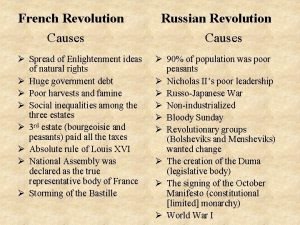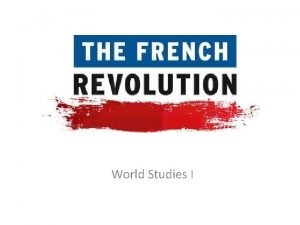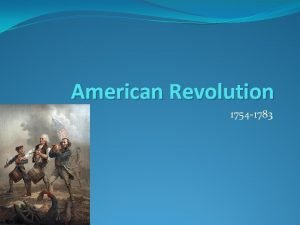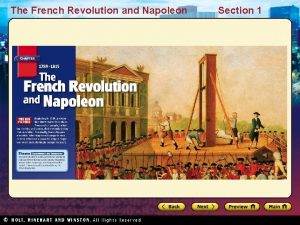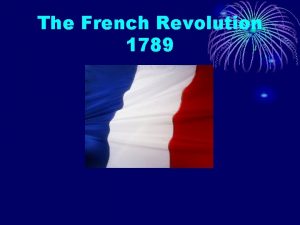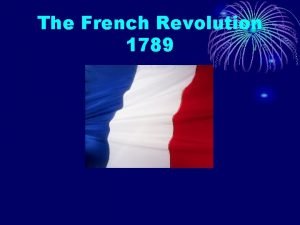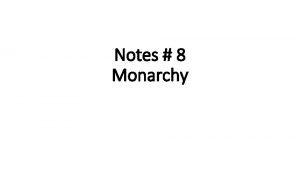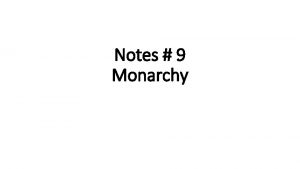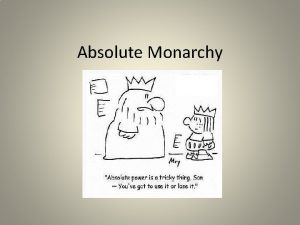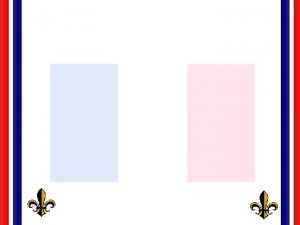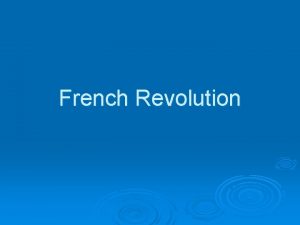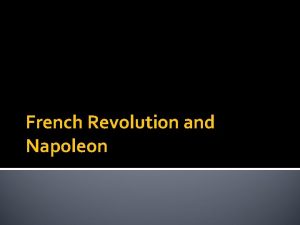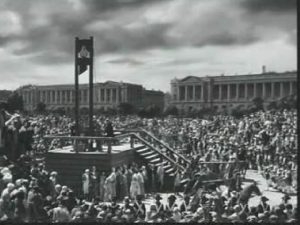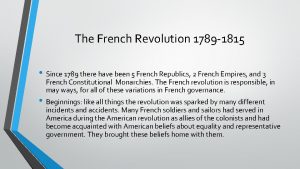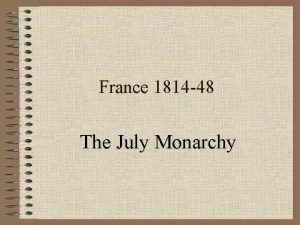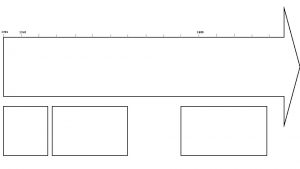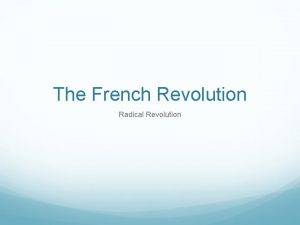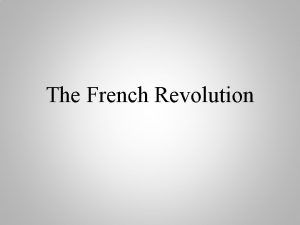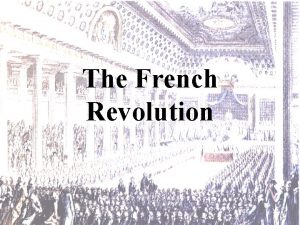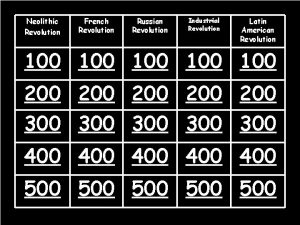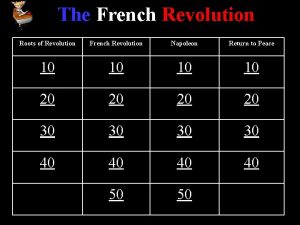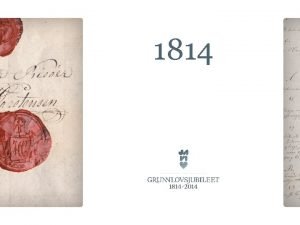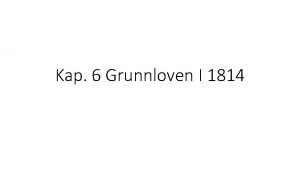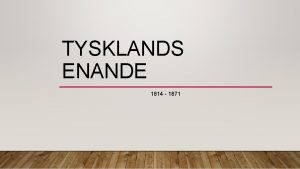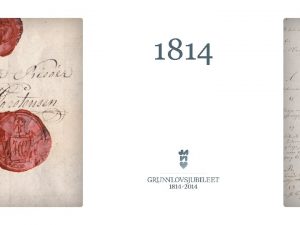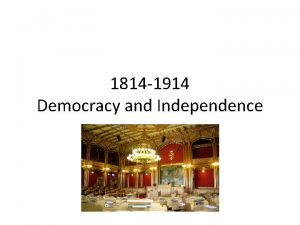The French Revolution 1789 1814 French Monarchy in








































































- Slides: 72

-The French Revolution 1789 -1814

-French Monarchy in Crisis. I. Louis XIV made France a tremendous power, but put the French in debt by helping to finance wars and making extravagant purchases

II. Louis XV said, “After us, the deluge (flood). ” By this he was saying that he did not care what happened to France after he died A. He saw the trouble ahead but did not attempt to stop it

III. The French people were divided into three estates A. The Clergy were members of the First Estate 1. The First Estate made money by collecting the Tithe and through their immense land holdings 2. Property owned by the First Estate was not taxed by the Monarchy, but the Church charged taxes to people who lived on their land

B. The Nobles were members of the Second Estate. Nobles had several unique privileges 1. Only Nobles could be officers in the army 2. Only Nobles could fill high Church positions 3. Nobles did not have to pay taxes

C. The Third Estate was made up of the Commoners of France. Not all Commoners were poor, some were very wealthy 1. The French middle class was known as the Bourgeoisie 2. Members of the French middle class were heavily influenced by the Enlightenment 3. Under the Old Regime, members of the Bourgeoisie paid most of the taxes


4. French peasants faced several hardships a. They paid heavy taxes b. They could not hunt 5. In the late 1700 s, inflation decreased the value of city workers’ labor

IV. Several factors were hurting the French economy and pushing the country toward an economic crisis A. Debt owed to bankers doubled after the American Revolution B. Poor harvests led to famine C. Tariffs and customs made trade difficult D. Guilds restricted new businesses

V. Attempts at reform A. Louis XVI’s first finance minister was Robert Turgot B. Turgot was influenced by the Enlightenment 1. He attempted to improve the French economy by cutting government spending, limiting the power of guilds, and reducing customs

C. Turgot made the radical suggestion that Nobles be taxed D. Turgot began to suggest to Louis XVI that if he did not act, he would be overthrown E. As the economic situation grew worse in the 1780’s, Louis XVI was forced to call a meeting of the Estates General

-The Revolution Begins. I. In 1789 Louis XVI summoned the Estates General to a meeting A. Louis was attempting to win support for reforms he hoped would improve the French economy 1. This was the Estates General’s first meeting in 175 years

B. When the Estates General met, the Third Estate immediately demanded reform of the voting system 1. Each Estate voted as a whole; this meant that the first and second Estate always out-voted the third C. The Third Estate declared themselves the National Assembly and wanted to write a constitution

D. After Louis XVI banished the National Assembly, many members made a promise not to leave the palace until France had a Constitution 1. This pledge became known as the Tennis Court Oath

II. In the summer of 1789 uprisings occurred in both urban and rural areas of France A. On July 14 th, 1789 citizens of Paris stormed the Bastille and released its prisoners 1. This was the symbolic start of the French Revolution and is known as Bastille Day

B. Peasants feared the French army was going to storm the countryside 1. Instead of fleeing, the peasants attacked rural nobles and held them as leverage 2. A large scale attack never came and this series of events became known as the Great Fear

III. After Bastille Day, the French Revolution began A. The Declaration of the Rights of Man outlined the basic rights that all individuals should have 1. Olympe de Gouges wrote the Declaration of the Rights of Woman and Female Citizen in 1791 B. In the fall an angry mob of women went to Versailles and took the royal family back to Paris as prisoners

C. The National Assembly began religious reforms 1. Freedom of worship 2. Bishops were no longer appointed by the King but were elected 3. Church lands were confiscated and sold to raise money

D. The National Assembly wrote the Constitution of 1791 1. France was to become a limited monarchy with three branches of government

IV. Responses to the Revolution A. Many French people did not like the Constitution of 1791 1. Radicals thought the constitution gave too much power to the king and wanted the monarchy eliminated 2. Nobles thought the constitution went too far

B. After the National Assembly presented the constitution, Louis XVI and his family attempted to flee France C. The new Legislative Assembly met in October of 1791 1. Their seating arrangement reflected political divisions a. Radicals on the left b. Moderates on the right

D. The radicals were also divided among themselves 1. The most radical group in France was known as the Jacobins

-The Revolution gets Messy. I. Defense of the Revolution A. Many European rulers were concerned about the situation in France 1. They were afraid it would inspire the people of their countries to rebel

2. Nobles in exile were lobbying Austrian and Prussian rulers to take action a. These nobles in exile were called Émigrés

B. In April 1792, France declared war on Austria and Prussia 1. Initially, the war went poorly 2. It ended up helping the Revolution because threat of defeat caused many French to unite behind the new Revolutionary leaders

C. In August 1792, the Radicals overthrew the new government 1. Louis XVI and his family were imprisoned 2. The Radicals called for a new constitution 3. This was the second Revolution in France

II. The Second Revolution in France A. The new governing body in France was known as the National Convention B. Radicals were elected to the Convention C. The National Convention abolished the monarchy and voted to make France a Republic

D. The Jacobins demanded Louis XVI be tried for treason 1. After discovering several letters written to émigrés and European kings asking for help, Louis XVI was convicted and executed


III. Attacks on the Revolution A. In March 1793; Britain, the Netherlands, and Spain all joined Austria and Prussia in the war against France B. Moderates began to criticize the Radicals 1. They thought the Revolution had gone too far

IV. Reign of Terror A. Because of the crisis the National Convention stopped work on the new constitution and established the committee of public safety 1. The committee sought to rid France of “Enemies of the Revolution” 2. The committee was led by Maximilien Robespierre

B. Between 20, 000 and 40, 000 people were killed 1. Many by the guillotine C. A draft was established to increase the strength of the military 1. After France achieved victory in war, Robespierre was arrested and executed

-The Rise and Fall of Napoleon. I. The Constitution of 1795 A. After the Reign of Terror, the French wrote the Constitution of 1795 and established the Directory 1. This was the fourth Revolutionary government in France B. The Directory had two branches: 1. The Legislative branch was elected by literate property owners 2. The Executive branch was made up of five directors chosen by the Legislature

C. The Directory faced a number of problems 1. Corrupt legislators were easily bribed 2. The Directory removed price controls and poor city workers rioted due to inflation 3. The Directory continued to be aggressive in war

II. Napoleon Bonaparte A. Napoleon rose through the ranks of the military during the French Revolution 1. Most officers fled France early in the Revolution; this enabled Napoleon to become a general at the age of 27

2. He was considered a hero in France after key victories against the British and Austria 3. Napoleon married a woman named Josephine who was a French socialite with political connections

B. After returning from war as a military hero, Napoleon and two directors overthrew the Directory 1. They wrote a new constitution and named Napoleon “First Council” 2. In 1802, Napoleon was elected First Council for life

C. In 1804, in a ceremony with the Pope, Napoleon named himself Emperor of the French 1. Napoleon had absolute power, but needed to maintain Revolutionary reforms to keep that power

III. Napoleon’s Reforms A. As part of Napoleon’s reforms, he created an organized law code known as the Napoleonic Code 1. All men were equal before the law 2. Freedom of religion 3. Eliminated laws that extended rights to women

B. Napoleon created the Bank of France 1. This national bank deposited tax money 2. Issued paper money 3. Made loans C. Napoleon set up Lycees 1. These were government run schools that trained officers

D. Napoleon signed an agreement with the Pope known as the Concordat of 1801 1. The election of Bishops ended 2. However, Church property confiscated during the Revolution was not returned Pope Pius VII

IV. From 1807 to 1812, Napoleon controlled most of mainland Europe A. While defeating European powers at war, Napoleon was able to keep these nations from uniting against him

B. Napoleon brought the ideas of the French Revolution, as well as his own, to the nations he defeated 1. Religious tolerance 2. An end to serfdom 3. The Napoleonic Code

C. Napoleon attempted to weaken Great Britain by establishing the Continental System 1. Great Britain was a major obstacle to Napoleon’s plans for conquest

2. The Continental System ordered European nations to stop trading with Britain a. In response, Britain taxed all ships bound for France 3. The Continental System hurt France and the rest of Europe more than it did Great Britain

V. Rise of European Nationalism A. Many European nations began to resent Napoleon for several reasons 1. High taxes 2. Soldiers were forced to serve in Napoleon’s army 3. Leaders wanted a return to traditional customs B. Opposition began in several parts of Europe 1. Prussia rebuilt its army 2. Spaniards began to practice guerilla warfare

VI. The Russian Invasion A. Russia, under Czar Alexander I, broke the Continental System and began trading with Britain 1. In response, Napoleon organized an army of 500, 000 men and invaded Russia

B. The Russians refused to fight 1. They instead retreated into Russia and destroyed their crops and livestock as they went 2. This was known as a Scorched Earth policy

C. When the Russians finally fought at Moscow, Napoleon’s troops defeated them 1. However, by this time the Russian winter was approaching 2. Napoleon had no supplies or shelter and was forced to retreat

D. The Russian army attacked Napoleon’s forces as they retreated 1. As a result of the attacking Russians and brutal conditions, only 100, 000 of Napoleon’s troops made it out of Russia alive

VII. Defeat of Napoleon A. With the French army weakened, Britain, Austria, Prussia, and Russia attacked France and defeated Napoleon 1. Napoleon went into exile on the island of Elba 2. Louis XVI’s brother, Louis XVIII, became king

B. Louis XVIII kept many of Napoleon’s reforms in place 1. Religious toleration 2. Napoleonic Code C. Louis XVIII faced several key problems 1. Returning émigrés demanded revolutionaries be punished and things return to tradition 2. Louis XVIII needed to honor the Revolution in order to maintain popular support

D. Napoleon used this opportunity to return to France, remove Louis XVIII from power and form an army 1. The British and Prussians did not hesitate to act a. They attacked quickly and defeated Napoleon at the Battle of Waterloo

French British -The Battle of Waterloo. Early Battle Prussians La Haye Saint Chateau Hougomount Cuirassiers Plancenoit Imperial Guard

French British -The Battle of Waterloo. Later Battle Prussians Chateau Hougomount 1. 2. 3. 4. Artillery attacks fail Infantry attacks fail Cavalry attacks fail Imperial Guard attacks fail La Haye Saint Plancenoit


2. Napoleon was sent into exile on the island of St. Helena where he stayed until he died in 1821 a. Napoleon’s return to power in France is known as the “ 100 Days”

VIII. The Congress of Vienna – 1815 A. European leaders met to restructure Europe after the defeat of Napoleon 1. The meeting was dominated by Conservative Reactionaries 2. Prince Metternich of Austria led the meeting

B. The Congress had two major goals: 1. Legitimacy – Restore the power of royal families across Europe 2. Balance of Power – France was reduced to its pre. Revolutionary boundaries

C. The Age of Metternich 1. For thirty years after the Congress, Metternich sought to avoid revolution and maintain the status quo in Europe

-Latin American Independence Movements. I. Trouble in the Colonies A. Creoles wanted to rid the colonies of Spanish officials

B. Enlightenment 1. The radical European ideas of Locke, Rousseau, and Montesquieu became popular C. The success of the American (1776) and French (1789) Revolutions encouraged Latin Americans


II. The Revolutions A. Napoleonic Wars 1. Weakened Spain’s ability to control the colonies 2. Much of Europe was in disarray

B. Revolution in Haiti – 1804 1. Haiti was the first nation in Latin America to win independence 2. Started as a slave revolt a. Toussaint L’Ouverture was a self-educated former slave who led Haiti to independence

C. Simon Bolivar A. K. A. “The Liberator” 1. Latin American George Washington 2. Created the Republic of Gran Colombia a. Modern day Venezuela, Columbia, Peru, and Ecuador

D. Jose de San Martin 1. Led independence movements in Argentina and Chile

E. Mexico 1. Miguel Hidalgo and Jose Morelos were both priests who sought independence for Mexico in the early 1800’s a. After Native Americans and Mestizos united, Mexico was able to win independence

F. Brazil 1. Granted independence peacefully by Portugal

III. New Republics in Latin America A. Obstacles to progress 1. Simon Bolivar stated, “America is ungovernable” 2. Geographic barriers made travel, communication, and unification difficult a. Social and economic divisions

3. As groups of people fought for control of new Latin American nations, military leaders known as Caudillos often took over and ruled as dictators

B. Three groups emerged as the power elite in most Latin American nations 1. The Military 2. The Catholic Church 3. Land owners
 The tennis court oath
The tennis court oath What was an immediate cause of the 1789 french revolution
What was an immediate cause of the 1789 french revolution 5th may 1789
5th may 1789 The french revolution
The french revolution Russian revolution vs french revolution
Russian revolution vs french revolution You should hope this game will be over soon
You should hope this game will be over soon The political and social system in france cartoon
The political and social system in france cartoon How did cardinal richelieu strengthen the french monarchy
How did cardinal richelieu strengthen the french monarchy Constitutional monarchy in france
Constitutional monarchy in france Jean-auguste-dominique ingres la grande odalisque 1814
Jean-auguste-dominique ingres la grande odalisque 1814 Russischer schriftsteller 1814 bis 1841
Russischer schriftsteller 1814 bis 1841 Ccc 1808
Ccc 1808 1814 took a little trip
1814 took a little trip Mapa europa 1814
Mapa europa 1814 Europa 1814
Europa 1814 Atg 1814
Atg 1814 The third agricultural revolution
The third agricultural revolution Linea de tiempo con las edades de la historia
Linea de tiempo con las edades de la historia French revolution symbols
French revolution symbols 1789
1789 Napoleon 1789
Napoleon 1789 The divisions in spanish colonial society 1789
The divisions in spanish colonial society 1789 1789 france
1789 france The chimney sweeper songs of experience
The chimney sweeper songs of experience Martin rochester
Martin rochester Europe in 1789
Europe in 1789 1797 - 1789
1797 - 1789 Against the gods 1789
Against the gods 1789 Bolton romanticism amp; politics 1789 1832 download
Bolton romanticism amp; politics 1789 1832 download Europa en 1789
Europa en 1789 1789 apush
1789 apush July 14 1789
July 14 1789 Art 1789
Art 1789 Louis xiv en costume de sacre symboles
Louis xiv en costume de sacre symboles Long term causes french revolution
Long term causes french revolution Aims of the french revolution
Aims of the french revolution French revolution timeline
French revolution timeline What factors caused the french revolution
What factors caused the french revolution Conclusion of french revolution
Conclusion of french revolution Discuss the following questions
Discuss the following questions French revolution causes and effects
French revolution causes and effects French revolution graphic organizer
French revolution graphic organizer Mirabeau and abbe sieyes
Mirabeau and abbe sieyes What factors led to the french revolution
What factors led to the french revolution The french revolution begins chapter 7 section 1
The french revolution begins chapter 7 section 1 Collective consciousness french revolution
Collective consciousness french revolution Neoclassisim
Neoclassisim Liberty brotherhood equality
Liberty brotherhood equality Revolution threatens the french king
Revolution threatens the french king The french revolution unfolds
The french revolution unfolds French revolution causes
French revolution causes The causes of the french revolution
The causes of the french revolution French revolution slides
French revolution slides French revolution women's march
French revolution women's march What is revolution
What is revolution French revolution storybook
French revolution storybook Jack and jill french revolution
Jack and jill french revolution Storming of the bastille cartoon
Storming of the bastille cartoon The three estates of french revolution
The three estates of french revolution French revolution timeline
French revolution timeline What did the first estate do
What did the first estate do Four phases of the french revolution
Four phases of the french revolution Les miserables background
Les miserables background French absolutism enlightenment & revolution
French absolutism enlightenment & revolution French revolution calender
French revolution calender Chapter 11 the french revolution and napoleon
Chapter 11 the french revolution and napoleon Chapter 23 section 1
Chapter 23 section 1 The french revolution and napoleon section 3 quiz
The french revolution and napoleon section 3 quiz French revolution political spectrum
French revolution political spectrum Enlightenment ideals
Enlightenment ideals Three estates of french revolution
Three estates of french revolution French revolution themes
French revolution themes Causes and effects of french revolution
Causes and effects of french revolution
